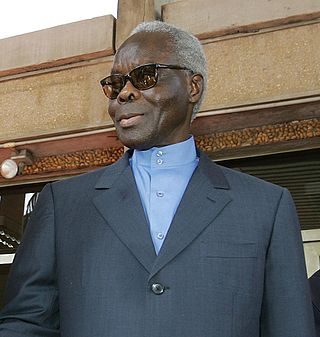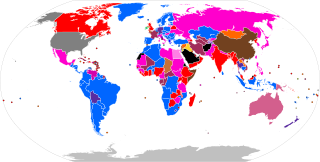
The Politics of Benin take place in the framework of a presidential representative democratic republic, wherein the President of Benin is both head of state and head of government, and of a multi-party system. Executive power is exercised by the government. Legislative power is vested in both the government and the legislature. The Judiciary is independent of the executive and the legislature. The current political system is derived from the 1990 Constitution of Benin and the subsequent transition to democracy in 1991. The Economist Intelligence Unit rated Benin a "hybrid regime" in 2022.

Mathieu Kérékou was a Beninese politician who served as President of Benin from 1972 to 1991 and again from 1996 to 2006.

Algeria elects on the national level a head of state – the president – and a legislature. The president is elected for a five-year term by the people. People's National Assembly has 407 members, elected for a five-year term in multi-seat constituencies by proportional representation. Eight seats in the national assembly are reserved for Algerians abroad. The Council of the Nation has 144 members, 96 members elected by communal councils and 48 members appointed by the president. Algeria has a multi-party system, with numerous political parties in which no one party often has a chance of gaining power alone, and parties must work with each other to form coalition governments. According to a US Embassy cable, the 2009 presidential elections were "carefully choreographed and heavily controlled", with the official turnout figure "exaggerated" by at least 45%.
Canada holds elections for legislatures or governments in several jurisdictions: for the federal (national) government, provincial and territorial governments, and municipal governments. Elections are also held for self-governing First Nations and for many other public and private organizations including corporations and trade unions. Municipal elections can also be held for both upper-tier and lower-tier governments.
There are three types of elections in Denmark: elections to the national parliament, local elections, and elections to the European Parliament. Referendums may also be called to consult the Danish citizenry directly on an issue of national concern.

Latvia elects on the national level a legislature. The Saeima has 100 members, elected for a four-year term by proportional representation with a 5% threshold. An unmodified Sainte-Laguë method is used to allocate seats. The parliamentary elections are held on the first Saturday of October. Locally, Latvia elects municipal councils, consisting of 7 to 60 members, depending on the size of the municipality, also by proportional representation for a four-year term.

On the federal level, there are two main elections in Austria: presidential elections and elections to determine the composition of the National Council (Nationalrat), the lower house of Austria's bicameral Parliament. The upper house, the Federal Council consists of delegates from the states and is not directly elected. These elections are governed by federal law, which also applies to European Parliament elections in Austria.

Elections in Benin take place within the framework of a multi-party democracy and a presidential system. Both the President and the National Assembly are directly elected by voters, with elections organised by the Autonomous National Electoral Commission (CENA).

Elections in Portugal are free, fair, and regularly held, in accordance with election law.

Elections in Egypt are held for the President and a bicameral legislature. The President of Egypt is elected for a six-year term by popular vote after draft amendments to the 2013 constitution altered the presidential term limits from the original four years to six years.
Estonia elects a legislature on the national level. The Riigikogu has 101 members, elected for a four-year term by proportional representation. A head of state – the president – is elected for a five-year term by parliament or an electoral college. Locally, Estonia elects local government councils, which vary in size. Election law states the minimum size of a council depending on the size of municipality. Local government councils are elected by proportional representation too.

Elections in Rwanda take place within the framework of a multi-party democracy and a presidential system. The President and majority of members of the Chamber of Deputies are directly elected, whilst the Senate is indirectly elected and partly appointed.

Nicéphore Dieudonné Soglo is a Beninese politician who was Prime Minister of Benin from 1990 to 1991 and President from 1991 to 1996. He was Mayor of Cotonou from 2003 to 2015. Soglo was married to Rosine Vieyra Soglo, the Beninois former First Lady and politician.

The unicameral National Assembly is Benin's legislative body.

The People's Republic of Benin was a socialist state located in the Gulf of Guinea on the African continent, which would become present-day Benin. The People's Republic was established on 30 November 1975, after the 1972 coup d'état in the Republic of Dahomey. It effectively lasted until 1 March 1990, with the adoption of a new constitution, and the abolition of Marxism–Leninism in the nation in 1989.
Electoral reform is a change in electoral systems which alters how public desires are expressed in election results.

An electoral system or voting system is a set of rules that determine how elections and referendums are conducted and how their results are determined. Electoral systems are used in politics to elect governments, while non-political elections may take place in business, non-profit organisations and informal organisations. These rules govern all aspects of the voting process: when elections occur, who is allowed to vote, who can stand as a candidate, how ballots are marked and cast, how the ballots are counted, how votes translate into the election outcome, limits on campaign spending, and other factors that can affect the result. Political electoral systems are defined by constitutions and electoral laws, are typically conducted by election commissions, and can use multiple types of elections for different offices.

Presidential elections were held in Benin on 6 March 2016, having been delayed by one week due to logistical constraints. Incumbent President Thomas Boni Yayi was at the end of his second presidential term and was constitutionally barred from running for a third. The elections grabbed the interest of many of the country's top businessmen, resulting in over 30 candidates trying to run for the presidency. A second round was held on 20 March, in which businessman Patrice Talon defeated Prime Minister Lionel Zinsou.

Patrice Guillaume Athanase Talon is a Beninese politician and businessman who has been President of Benin since 6 April 2016.













